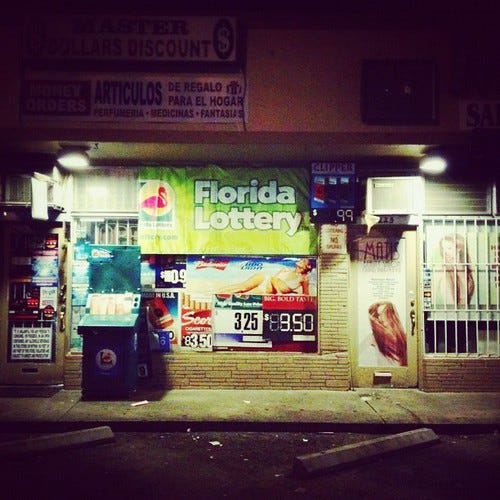Last-minute legislation could give more money to Publix, 7-Eleven and Circle K — but less to Florida students
The Republican-controlled Florida Legislature tucked a provision into the state budget that will make the Florida Lottery pay more money to the gas stations and grocery stores that sell its tickets

This is Seeking Rents, a newsletter devoted to producing original journalism — and lifting up the journalism of others — that examines the many ways that businesses influence public policy across Florida, written by Jason Garcia.
Last fall, a couple of months before the 2022 legislative session began, a gas-station lobbying group and one of its biggest members made a bunch of campaign contributions to the political committees of key legislative leaders.
Between October and December, the Florida Petroleum Marketers Association and Doral-based Sunshine Gasoline Distributors gave a combined $25,000 to Senate President Wilton Simpson (R-Trilby), $15,000 to future Senate President Ben Albritton (R-Wauchula) and $10,000 to future House Speaker Paul Renner (R-Palm Coast), among others.
And last month, about two weeks after session ended, the FPMA and Sunshine made some more campaign contributions — including another $50,000 for Simpson, $25,000 for Albritton and $7,500 for Renner.
In between, the Republican-run Florida Legislature gave the FPMA something it has wanted for at least a year: Legislation that will force the Florida Lottery to pay more money to the gas stations and grocery stores that sell its tickets.
The move could mean hundreds of thousands of dollars in extra payments next year to companies like Sunshine, which owns around 400 stores. And it could mean even bigger windfalls for a handful of giant retail chains, including Publix, 7-Eleven and Circle K.
But it could also mean millions of dollars less next year for Bright Futures Scholarships and other public-education programs that receiving funding from Lottery profits.
The little-noticed provision was tucked into a 126-page budget bill near the end of this year’s legislative session. It happened amid final budget negotiations between the House and Senate, where the decisions are made in secret and often without any public explanation.
Right now, the Florida Lottery pays retailers a 5 percent commission on every ticket they sell or give away as a prize, plus a 1 percent cashing bonus when they redeem winning tickets. Under the new law, the Florida Lottery will pay retailers a straight 5.75 percent commission on all tickets.
Florida lawmakers ordered the change without any public analysis of how much this will cost. But had the 5.75 percent commission been in place last year, it could have meant an extra $19.6 million in payments to retailers, according to my analysis of Lottery commission data.*
That’s enough money to pay for around 3,500 Bright Futures scholarships.
The 5.75 percent commission will only be in place for one year. But Ned Bowman, the executive director of the Florida Petroleum Marketers Association, said he expects lawmakers will eventually make the change permanent.
“I think that’ll go forward. I think there’s enough strength in that,” he said. “Our members haven’t had a raise in 34 years...Minimum wage is going up. All your costs are going up.”
The provision first surfaced in the Florida House. But it’s worth noting that the Florida Senate filed a bill this year to permanently raise Lottery commissions to 6 percent, though that bill didn’t pass.
And the higher commissions were defended by Albritton, who presided over this part of the budget in the state Senate.
“One argument could be, you know, we have costs that are escalating everywhere, right? We have inflation that is running rampant everywhere,” Albritton said when Sen. Annette Taddeo (D-Miami) asked him why the Lottery should give more money to retailers. “That would be one perspective I could offer you.”
Albritton told Taddeo that he didn’t think the change would affect education funding — even though making the Lottery pay more money to retailers would leave it with less money to transfer to education. (The Florida Lottery must transfer a minimum percentage of its gross sales to the state’s “Educational Enhancement Trust Fund.” But it’s also supposed to transfer any profit it has left over after paying expenses, including retailer commissions.)
The Florida Lottery itself says it doesn’t know if the change will affect education funding.
“At this time, we are unable to say with certainty what impact, if any, the change in retailer commissions will have on our overall transfers to the Educational Enhancement Trust Fund,” Lottery spokesperson Keri Nucatola said.
(You could argue that higher commissions could entice more retailers to sell Lottery tickets or get existing retailers to sell more tickets, and that you’d offset the narrower profit margins by selling more overall...although nobody in the Legislature actually made that argument, at least not in public.)
Florida Gov. Ron DeSantis hasn’t signed this bill yet, although he’s unlikely to veto it. And one of the biggest winners in all of this? Publix Supermarkets, the grocery giant that sells more lottery tickets than anyone else (and which has given $150,000 to DeSantis since he was elected governor).
Publix would have made an extra $2 million last year, according to my analysis of Lottery data.
Lobbyist-disclosure records in the state House show that Publix was involved in Lottery-related issues this session. But the company declined to say whether it was part of the push to increase commissions.
*About the estimate
Here’s how I arrived at that $19.6 million estimate:
According to data provided by the Florida Lottery, the Lottery paid retailers $458.4 million in 5 percent commissions and $49.2 million in 1 percent cashing bonus commissions during the 2021 fiscal year. That’s a combined total of $507.6 million paid to retailers.
Now, paying $458.4 million in 5 percent commissions implies just under $9.2 billion in ticket sales. (Note: This is about $100 million more in ticket sales than the Lottery reports on its annual financial statements, but the Lottery also pays commissions on tickets that retailers give away for free.)
Apply a 5.75 percent commission to $9.2 billion in ticket sales, and you get $527.2 million.
That’s an extra $19.6 million for retailers.
I used the same methodology for individual retailers. For instance, the roughly 1,100 Publix stores that sold lottery tickets in fiscal 2021 were paid a combined $103.8 million between the 5 percent commission and the 1 percent cashing bonus.
Under a straight 5.75 percent commission, those Publix stores would have been paid roughly $106 million — an increase of just over $2 million.




